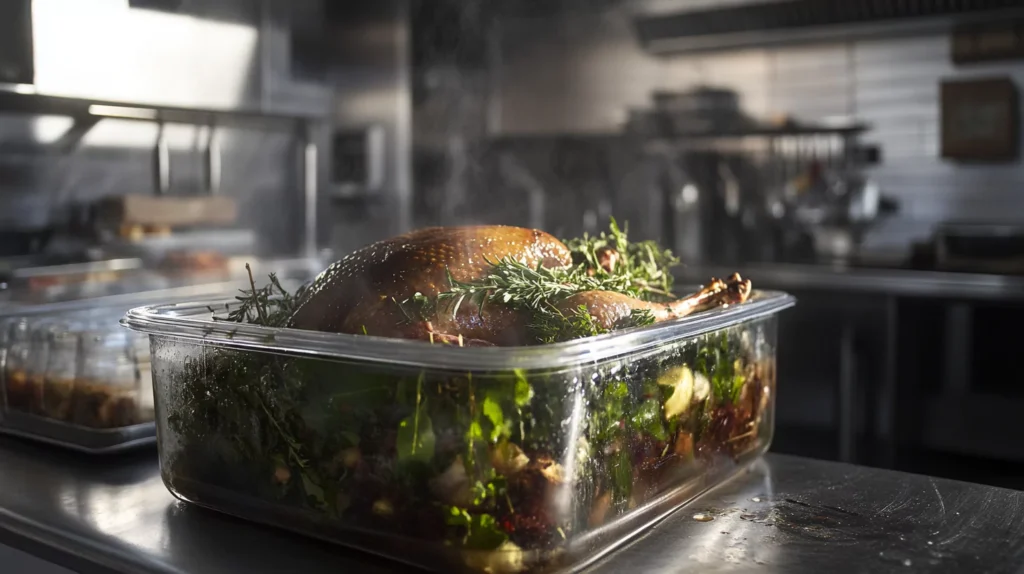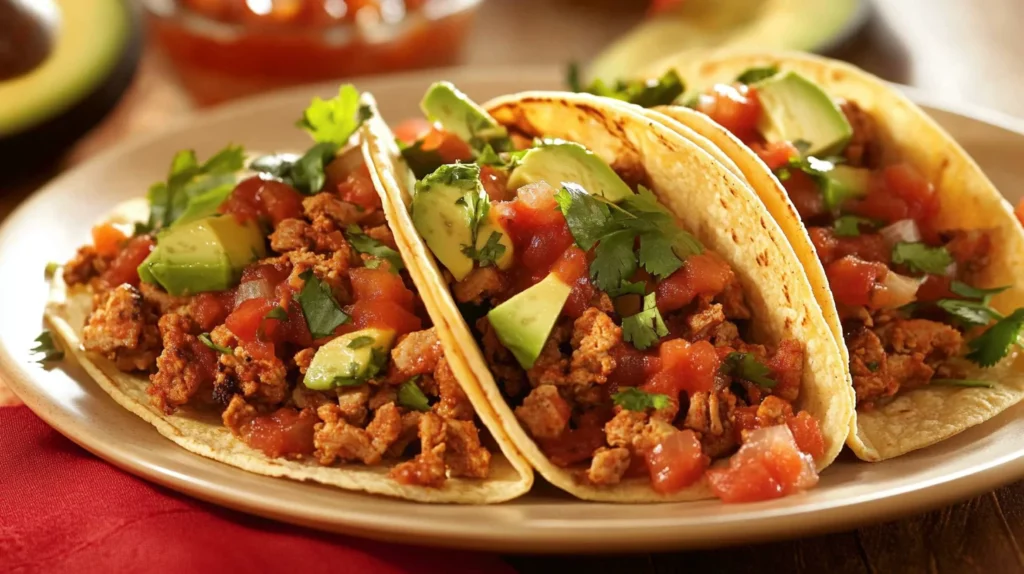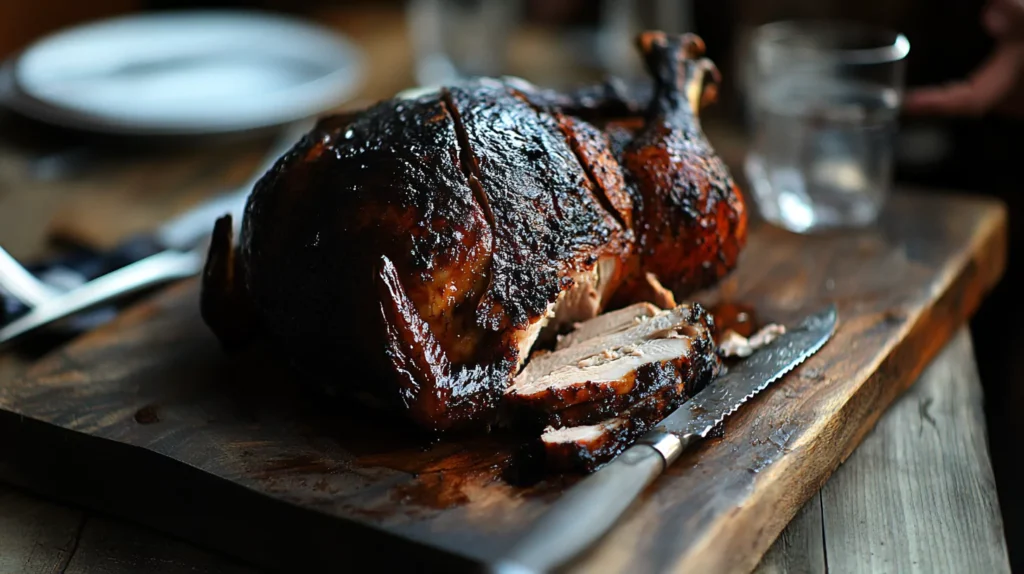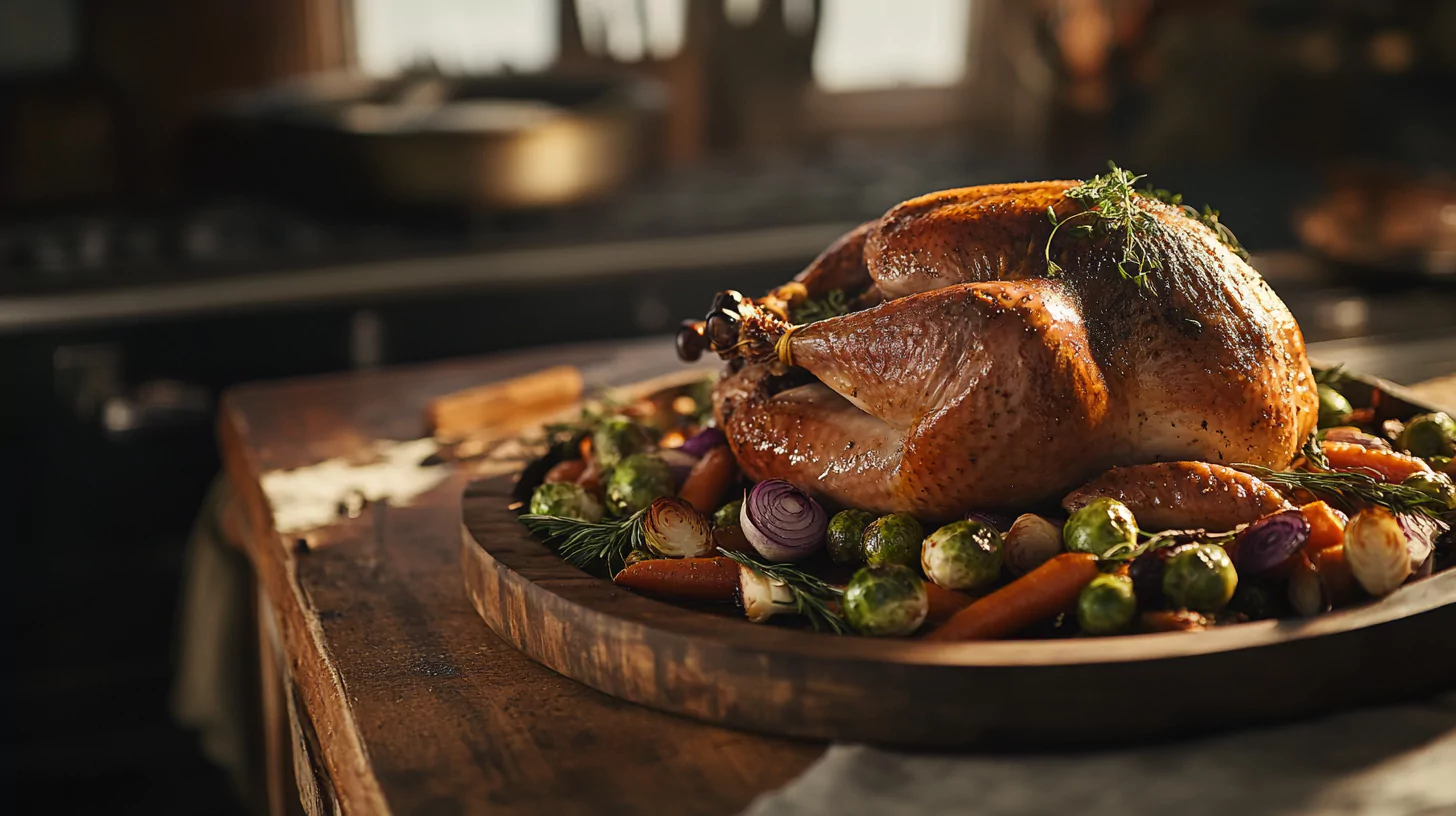Wild turkey is a culinary treasure for hunters and food enthusiasts, but it often comes with a distinctive “gamey” flavor that can be off-putting to some. This flavor, while natural and part of the bird’s unique appeal, can be minimized or even eliminated with the right preparation and cooking techniques. If you’ve ever wondered how to make wild turkey not taste gamey, you’re in the right place!
In this comprehensive guide, we’ll explore what causes the gamey taste in wild turkey and share proven methods to neutralize it, from proper field dressing to the best recipes and cooking techniques. Whether you’re new to preparing wild game or a seasoned cook looking to refine your skills, these tips will help you serve a meal that everyone will love. For more inspiration and detailed recipes, check out our guide on wild turkey recipes to impress and savor every bite.
Understanding the Gamey Flavor
What is Gamey Taste?
The term “gamey” refers to the stronger, earthier flavor often found in wild game meats compared to domesticated animals. This flavor is influenced by the animal’s diet, activity levels, and the environment in which it lived. Wild turkey, in particular, is leaner and more muscular than farm-raised turkeys, contributing to its distinct taste.
Gamey flavors are often described as intense, slightly metallic, or even musty, which can be unfamiliar to those accustomed to commercially farmed meats. While some enjoy this unique profile, others prefer to tone it down to enjoy the meat’s natural essence without the overpowering taste.
Why Does Wild Turkey Taste Gamey?
Wild turkeys differ significantly from their farm-raised counterparts. Their diet consists of nuts, seeds, insects, and other natural food sources, which contribute to their stronger flavor. Additionally, wild turkeys are more active, leading to leaner muscles and less fat, which can intensify the taste if not handled correctly. Factors like improper field dressing or inadequate preparation can also amplify the gamey flavor.
Preparation Techniques for Reducing Gamey Flavor
Field Dressing and Aging
The first step in reducing the gamey taste starts in the field. Proper field dressing, which involves removing the internal organs promptly, is essential to prevent the meat from absorbing strong odors or tastes. Aging the meat in a controlled environment for a few days allows natural enzymes to break down muscle fibers, tenderizing the meat and mellowing its flavor.
Brining the Wild Turkey
Brining is a tried-and-true method to improve the flavor and texture of wild turkey. By soaking the meat in a saltwater solution, you can draw out impurities and reduce the gamey taste.

Step-by-Step Brining Process:
- Prepare the Brine: Combine water, salt, sugar, and optional herbs or spices (e.g., rosemary, thyme, garlic) in a large container.
- Submerge the Turkey: Place the wild turkey in the brine, ensuring it is fully covered.
- Refrigerate: Allow the meat to soak for 12–24 hours in the refrigerator.
- Rinse and Dry: Rinse the turkey thoroughly under cold water and pat it dry before cooking.
Marinades and Soaking Methods
Marinades work wonders in softening the meat and infusing it with complementary flavors. Acidic marinades (using ingredients like vinegar, lemon juice, or wine) help break down proteins, while dairy-based marinades (such as buttermilk or yogurt) neutralize strong flavors.
Popular Marinade Combinations:
- Lemon juice, olive oil, garlic, and oregano.
- Buttermilk, hot sauce, and black pepper.
- Soy sauce, ginger, honey, and sesame oil.
Trimming and Cutting
Certain parts of the wild turkey, such as the skin, fat, and silver skin (a connective tissue layer), often contribute to the gamey flavor. Removing these elements before cooking can significantly improve the meat’s taste and texture.
Cooking Methods to Minimize Gamey Taste
Low and Slow Cooking
One of the best methods for preparing wild turkey is slow cooking. This technique tenderizes the meat and allows flavors to meld, helping to neutralize the gamey taste. Popular low-and-slow methods include smoking, braising, and roasting.
Smoking Wild Turkey:
- Preparation: Use a smoker and select mild-flavored wood like apple or cherry to avoid overpowering the turkey.
- Seasoning: Rub the turkey with a blend of herbs and spices, ensuring even coverage.
- Cooking: Smoke at a low temperature (around 225°F) for several hours until the internal temperature of the meat reaches 165°F.
Braising:
- Method: Braise the turkey in a flavorful liquid like chicken stock, white wine, or tomato-based sauce.
- Tips: Add vegetables and herbs like carrots, onions, and thyme to complement the flavors and create a delicious base for gravy or sauces.
High-Temperature Searing
Quickly searing the turkey over high heat can lock in moisture and create a flavorful crust, reducing the prominence of the gamey flavor. This method is particularly effective for smaller cuts like turkey breast or tenderloin.
Searing Tips:
- Pan Choice: Use a heavy skillet, such as cast iron, for even heat distribution.
- Oil Selection: Use oils with a high smoke point, like avocado or canola oil.
- Technique: Sear each side of the meat for 2–3 minutes before finishing in the oven or adding it to a recipe.
Using Strong Flavors and Seasonings
Wild turkey pairs well with bold seasonings that complement its natural flavor. Spices such as paprika, cumin, coriander, and cayenne can enhance the taste, while herbs like rosemary, thyme, and sage provide an aromatic balance.
Seasoning Blend Example:
- 2 teaspoons smoked paprika
- 1 teaspoon garlic powder
- 1 teaspoon onion powder
- 1/2 teaspoon cayenne pepper
- Salt and black pepper to taste
Rub this blend generously over the turkey before cooking to infuse it with rich flavors.
Pairing with Complementary Ingredients
Combining wild turkey with the right ingredients can mask its gamey notes and create a harmonious dish. Sweet, tangy, or earthy accompaniments often work well.
Pairing Ideas:
- Fruits: Cranberries, apples, or oranges add sweetness and acidity.
- Vegetables: Root vegetables like carrots, parsnips, and sweet potatoes enhance the dish’s natural sweetness.
- Sauces: A honey mustard glaze or cranberry reduction can add depth and sweetness to balance the flavor.
Recipes for Wild Turkey Without Gamey Flavor
Herb-Brined Roasted Wild Turkey
This recipe highlights the benefits of brining and roasting for a tender, flavorful result.
Ingredients:
- 1 wild turkey
- 1 gallon water
- 1 cup salt
- 1/2 cup sugar
- Fresh herbs (rosemary, thyme, sage)
- Butter or olive oil
Instructions:
- Brine the turkey using the method described earlier.
- Preheat the oven to 350°F.
- Rub the turkey with butter or olive oil and season with herbs and spices.
- Roast for 2–3 hours, basting every 30 minutes, until the internal temperature reaches 165°F.
Smoked Wild Turkey Breast
Smoking adds a rich, smoky flavor that complements wild turkey’s natural taste.
Ingredients:
- 1 wild turkey breast
- Spice rub (paprika, garlic powder, brown sugar, salt, pepper)
- Wood chips (apple or cherry)
Instructions:
- Season the turkey breast generously with the spice rub.
- Preheat the smoker to 225°F and add soaked wood chips.
- Smoke the turkey breast for 2–3 hours, or until the internal temperature reaches 165°F.
Wild Turkey Tacos
Bold spices and fresh toppings make these tacos a crowd-pleaser.

Ingredients:
- Wild turkey meat (shredded or diced)
- Taco seasoning
- Tortillas
- Toppings: avocado, salsa, shredded cheese, cilantro, lime
Instructions:
- Season the turkey meat with taco seasoning and cook in a skillet over medium heat.
- Assemble the tacos with the cooked meat and your choice of toppings.
- Serve with lime wedges for a zesty finish.
Common Mistakes to Avoid

Overcooking the Meat
One of the most common errors when preparing wild turkey is overcooking. Unlike farm-raised turkey, wild turkey is leaner and can dry out quickly if exposed to high heat for too long. Overcooked meat tends to amplify the gamey taste rather than minimize it.
Tips to Avoid Overcooking:
- Use a Meat Thermometer: Cook until the internal temperature reaches 165°F and no higher.
- Moisture Retention: Use cooking methods that retain moisture, such as brining, marinating, or covering the meat with foil while roasting.
Skipping the Brining or Marinating Step
Neglecting the crucial step of brining or marinating can result in a dish that tastes overly gamey or tough. These processes are essential for tenderizing the meat and neutralizing strong flavors.
Solutions:
- Plan Ahead: Allocate at least 12–24 hours for brining or marinating.
- Enhance the Brine/Marinade: Incorporate flavorful herbs, spices, and acidic elements for maximum impact.
Choosing the Wrong Cooking Method
Some cooking methods are better suited to wild turkey than others. For instance, grilling or frying without proper preparation can intensify the meat’s natural flavor and make it taste tougher.
Preferred Methods:
- Smoking: Adds complexity and tenderness.
- Braising: Keeps the meat moist and tender while infusing it with other flavors.
- Roasting: Ideal for whole birds when combined with brining or stuffing.
FAQs
1. What is the best way to remove the gamey taste from wild turkey?
The best way is to combine proper preparation (field dressing, brining, and trimming) with complementary cooking techniques like smoking, slow roasting, or marinating in flavorful, acidic ingredients.
2. How long should I brine wild turkey to reduce the gamey flavor?
For optimal results, brine the turkey for 12–24 hours in a solution of water, salt, sugar, and herbs. This time frame allows the meat to absorb moisture and neutralize strong flavors.
3. Can I use milk to reduce the gamey taste of wild turkey?
Yes, soaking wild turkey in milk or buttermilk is a great way to tenderize the meat and remove gamey notes. Dairy-based marinades are effective for mild flavor profiles.
4. What spices work best to mask the gamey taste?
Spices like smoked paprika, cumin, garlic powder, and cayenne, combined with fresh herbs like thyme, rosemary, and sage, work wonders in balancing the flavor of wild turkey.
5. Is wild turkey always gamey, or can it taste like farm-raised turkey?
With the right preparation and cooking techniques, wild turkey can taste similar to farm-raised turkey. Brining, marinating, and slow cooking are key to achieving a milder flavor.
6. What part of the wild turkey is the least gamey?
The breast meat of a wild turkey is typically less gamey than the legs or thighs, as it contains fewer connective tissues and less fat.
Conclusion
Wild turkey offers a flavorful and nutritious alternative to farm-raised poultry, but its gamey taste can be challenging for some. By employing proper preparation methods such as brining, trimming, and marinating, along with choosing the right cooking techniques, you can transform wild turkey into a dish that even the most skeptical diners will enjoy. Whether you prefer smoky, roasted, or spiced preparations, the steps outlined in this guide will help you achieve a perfectly balanced meal.
The next time you prepare wild turkey, experiment with these tips and recipes to create a dish that highlights its unique flavor without overwhelming your palate. With a little effort and creativity, wild turkey can become a cherished addition to your culinary repertoire.

